Morgan Elementary 24-25
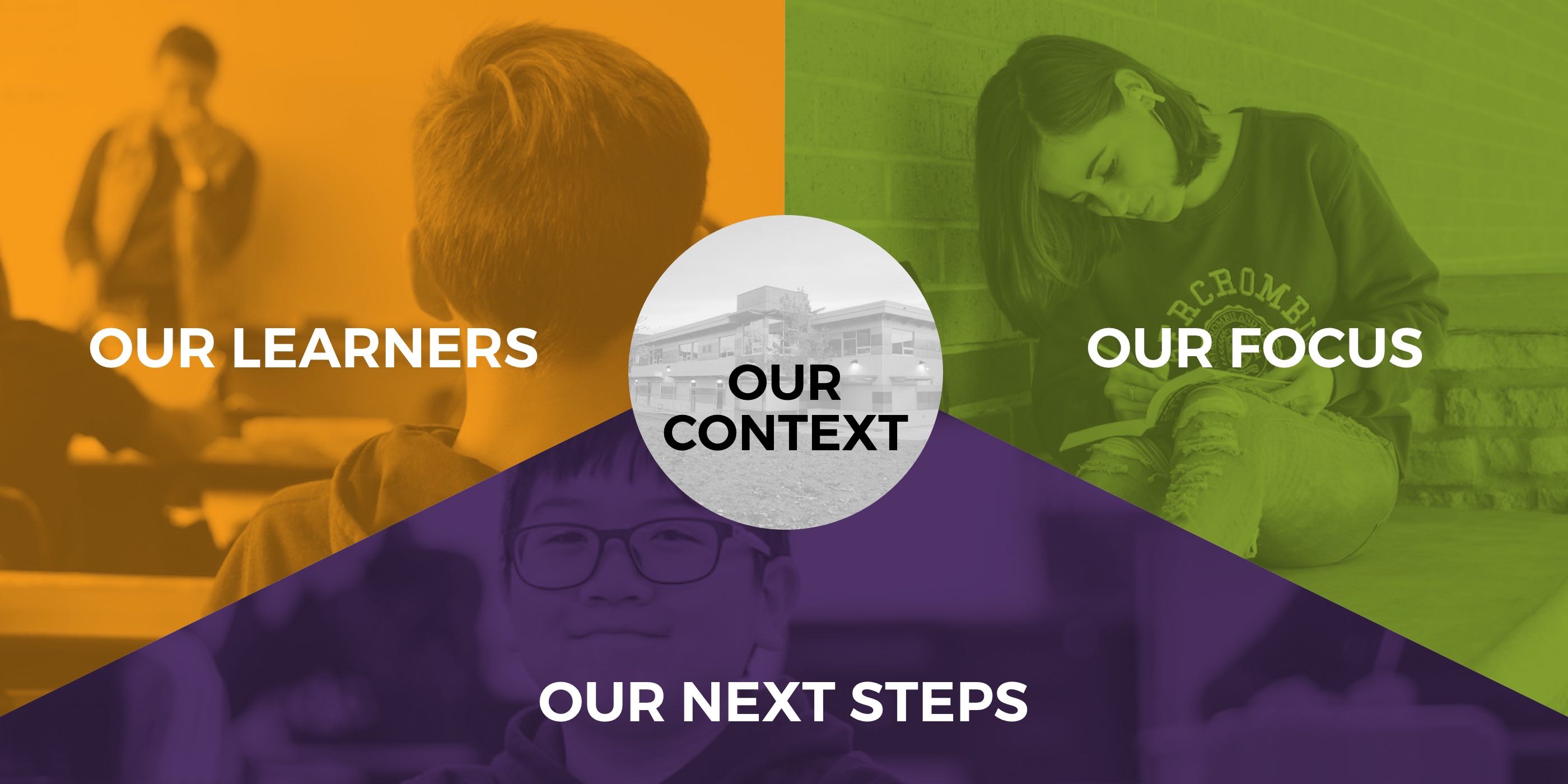

OUR CONTEXT
We respectfully acknowledge that Surrey Schools are located on the traditional, unceded, and shared territories of the Coast Salish peoples: the q̓íc̓əy̓ (Katzie), the q̓ʷa:n̓ƛ̓ən̓ (Kwantlen), and the SEMYOME (Semiahmoo) First Nations—stewards of this land since time immemorial. We recognize this history with the understanding that respectful relationships and partnerships with Indigenous peoples are essential to truth and reconciliation.
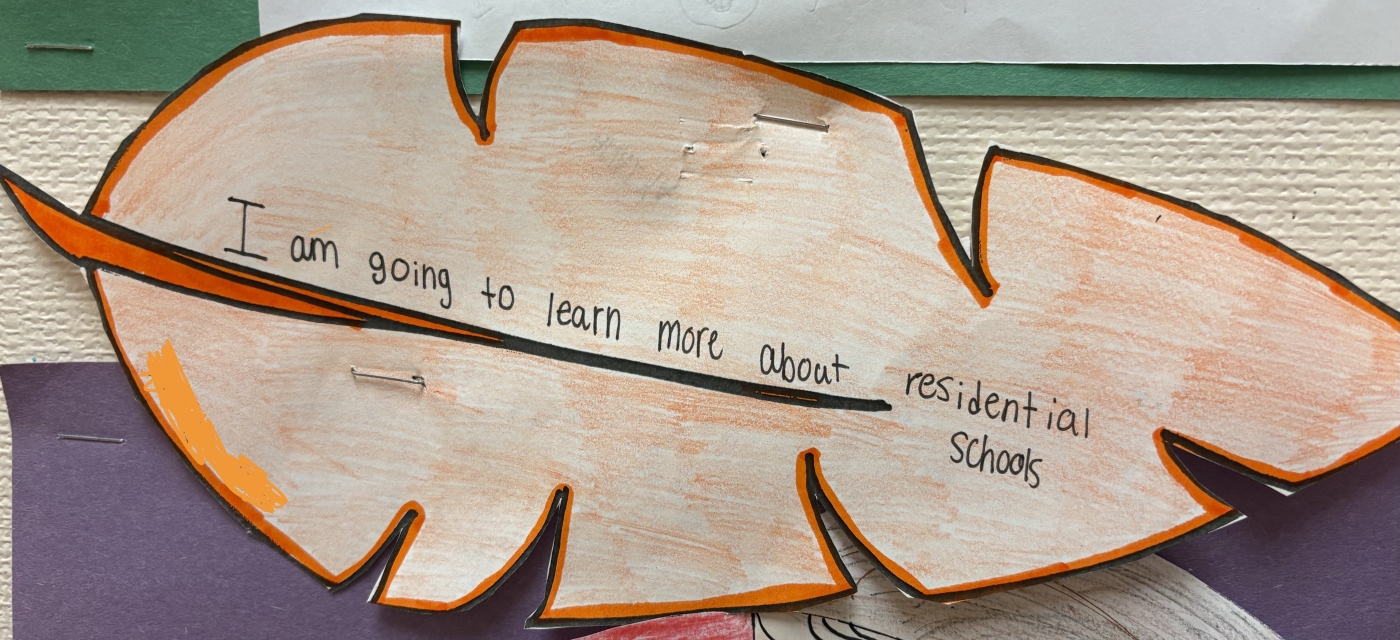
Morgan Elementary serves approximately 550 students from Kindergarten through Grade 7 and is located in the South Surrey region.
At Morgan, we are a community of culturally and academically diverse learners. Our students are curious, inquisitive, and thoughtful. Many spend their entire elementary journey with us, from Kindergarten to Grade 7. They are developing stamina in their learning and strengthening their ability to collaborate, share knowledge, and support one another.
Our students are strong advocates for their learning needs. They are learning to access strategies and understand the importance of choice in their educational journey. Morgan students are communicative and enjoy sharing their thoughts and connections with classmates, teachers, and families.
Morgan is a close-knit community, strongly supported by an active Parent Advisory Council (PAC). The PAC contributes to classroom needs and supports events such as field trips, artist residencies, and hip-hop dance lessons. Community events—including welcome barbecues, movie and activity nights, family dances, pancake breakfasts, and hot lunch programs—are well attended and celebrated.
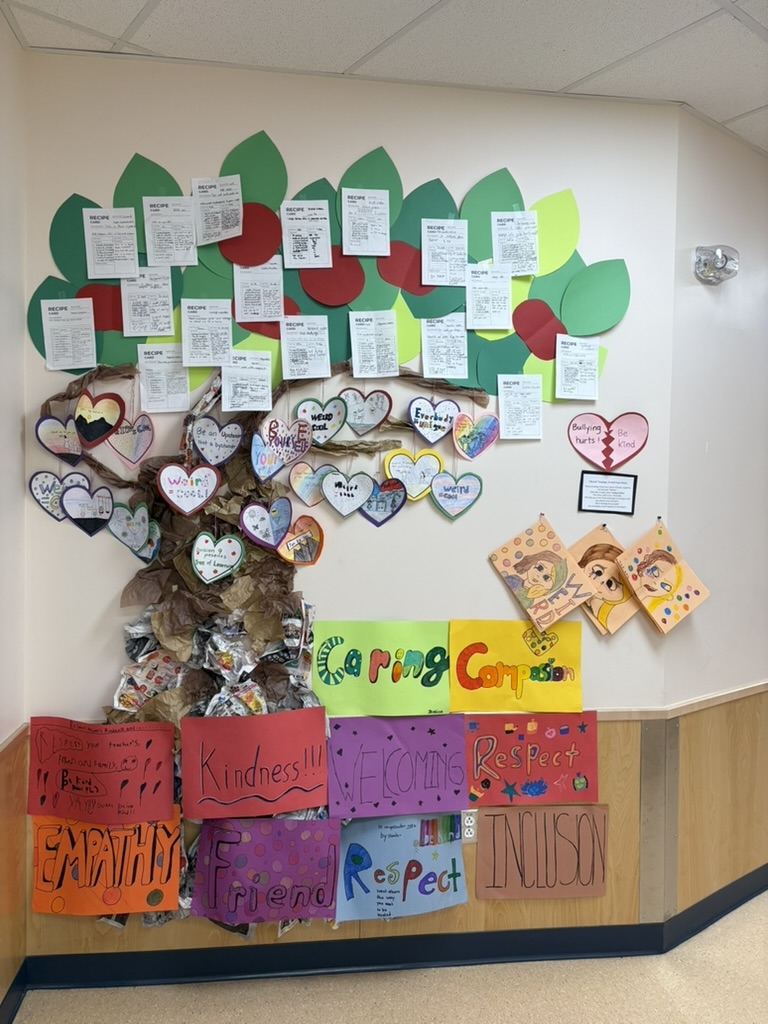
Our students enjoy a wide range of extracurricular athletic opportunities, including basketball, volleyball, soccer, track and field, cross country, and badminton. Additional enrichment opportunities include student leadership, the Reading Link Challenge, Grade 7 Band, the Young Entrepreneurs Fair, raising butterfly larvae, and the Minecraft Challenge. Leadership roles include Lunch Monitors, Door Monitors, Library Monitors, Assembly Set-Up and Tech Crew, and Announcement Helpers.
This year, we were especially proud to present a school-wide musical production of Frozen Jr. This production showcased our students’ talents in singing, dancing, acting, cheerleading, and tap dancing. Our backstage crew also demonstrated their technical skills in managing lighting, sound, microphones, props, and set changes.
We are particularly proud of the way our students support one another and celebrate the diversity within our school. Languages spoken at Morgan include English, Mandarin, Chinese, Korean, Punjabi, Urdu, Spanish, Cantonese, Turkish, Russian, Hindi, Japanese, Arabic, Gujarati, and Tamil. Students take pride in their multilingual abilities and often volunteer to assist with translation when needed.
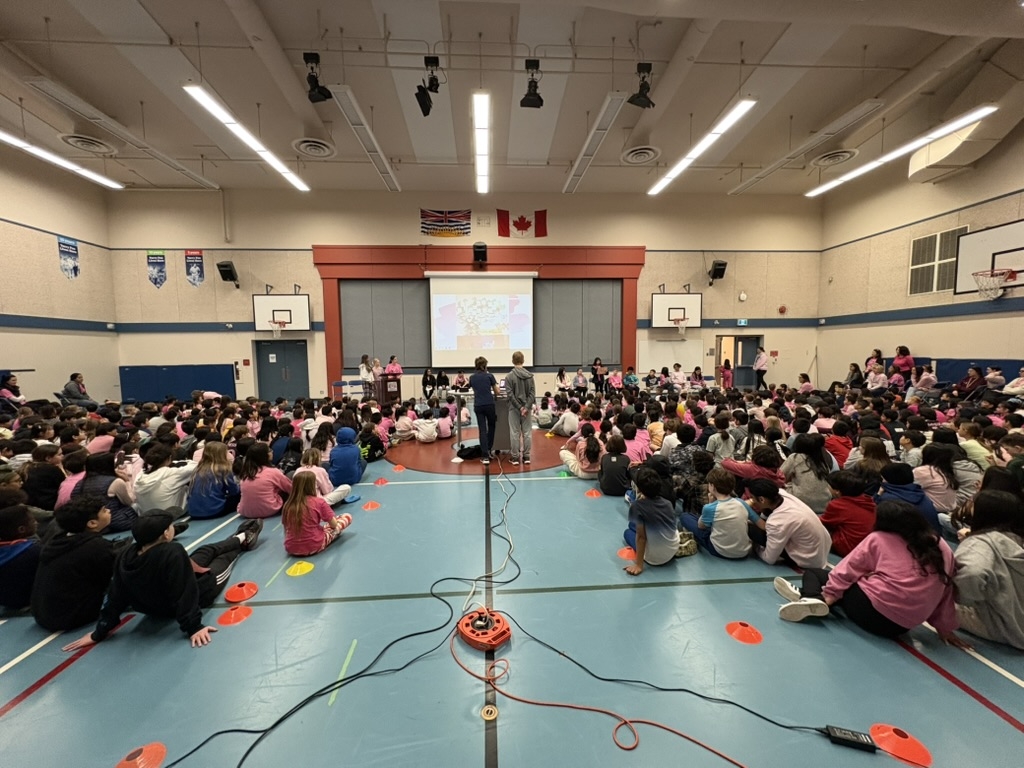
OUR LEARNERS
At Morgan, our students are motivated and eager to learn—whether it’s acquiring a new language, mastering a new song, or exploring a new math strategy. Their enthusiasm for learning is evident across all areas of the curriculum. Many of our students begin their educational journeys early, with high participation in preschool programs—often over a two-year span—and StrongStart initiatives. They arrive at Morgan well-traveled, articulate, and enriched by a wide range of early experiences.
Our students are deeply connected to the broader community through extensive involvement in extracurricular activities. These include community sports such as hockey, soccer, lacrosse, and baseball; parks and recreation programs; dance and cheerleading; competitive swimming; musical theatre; and music lessons. Many also participate in high-level competitive teams or receive additional academic support through tutoring and enrichment programs. As a result, students come to Morgan ready and excited to learn.
Morgan’s educators understand that optimal learning occurs when conditions are tailored to each student’s needs. The First Peoples Principles of Learning are embedded throughout our curriculum and guide our teaching practices. These principles emphasize:
- Recognizing the consequences of one’s actions
- Understanding generational roles and responsibilities
- Valuing Indigenous knowledge
- Embedding learning in memory, history, and story
- Honoring patience and time in the learning process
- Exploring personal identity through learning
Our staff are committed to helping students set realistic academic goals and supporting them with clear, targeted instruction. Students are increasingly aware of their strengths and are learning to advocate for both their academic and social-emotional needs.

The students embraced the challenge of reflecting on what it means to be a “Good Mustang” and thoughtfully brainstormed ways they could embody this in their daily actions. Below are some of the reflections shared by our students.
These writing samples clearly demonstrate that our students are reflective thinkers who are conscientious about their roles as contributing members of the Morgan school community.
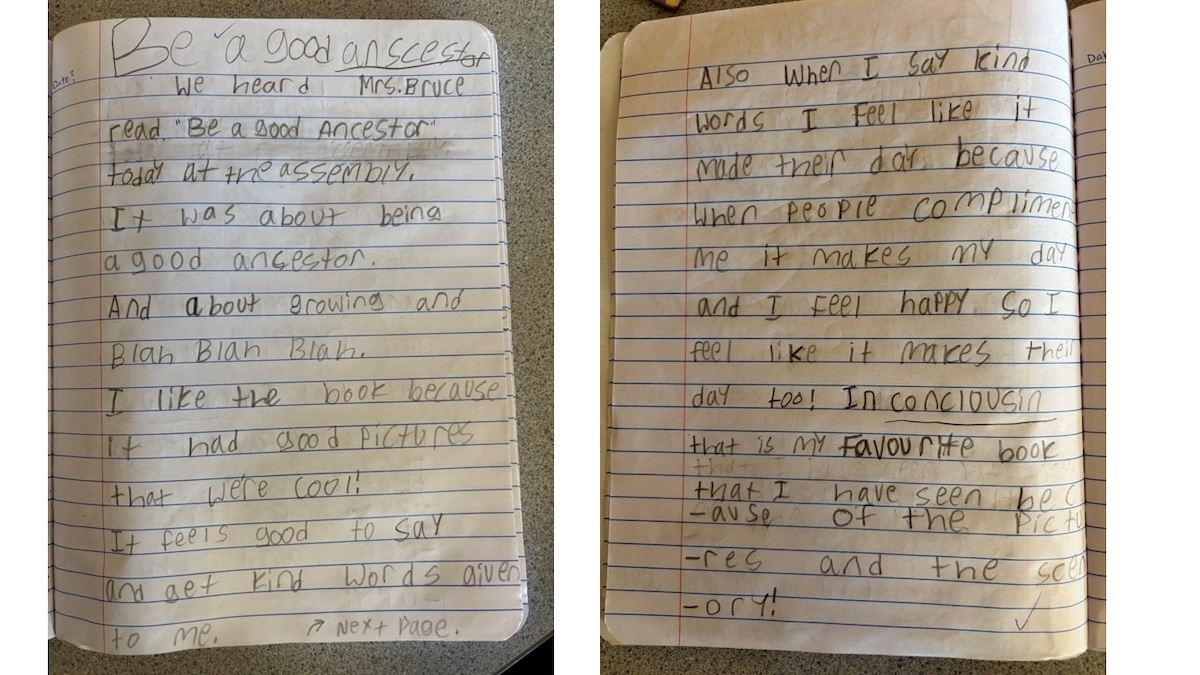
Literacy Development and Assessment Insights
FSA data indicates a more pronounced decline in Grade 4 performance since 2019–2020, likely due to pandemic-related disruptions. In contrast, Grade 7 students have maintained their literacy skills more consistently. The gap between school and district/provincial averages is more evident in Grade 4, underscoring the need for targeted early literacy interventions—an observation that aligns with classroom experiences.
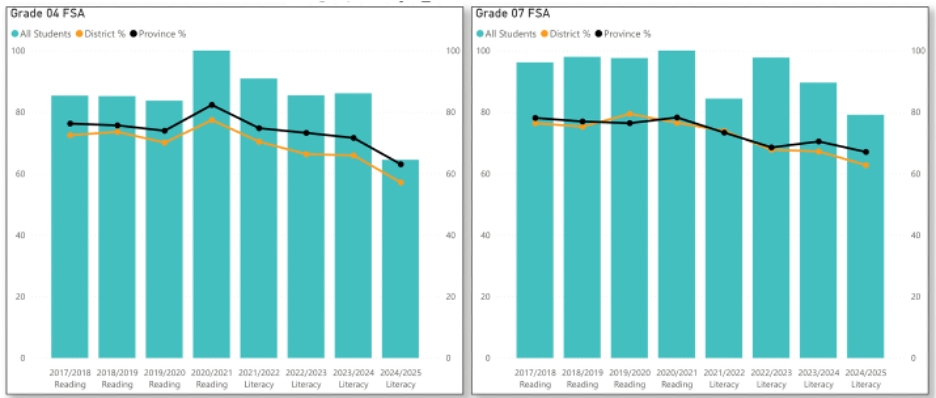
Following last year’s school-wide focus on literacy engagement—particularly reading—both students and staff demonstrated renewed enthusiasm. This was reflected in a significant increase in library circulation, especially among intermediate students.
This year, teachers observed that while students across all grades were confident in oral expression and engaged in reading, writing remained more challenging. Many students, particularly in the intermediate grades, were capable writers but showed reluctance to initiate writing tasks. This prompted staff to explore strategies to build student confidence and effectiveness in writing.
In contrast, primary students were eager to write and share their ideas. Instruction at this level focused on developing writing mechanics and guiding students toward more sophisticated expression. A cohort of teachers participated in professional learning through the Surrey School District’s Responding to Readers inquiry, supported by Literacy Helping Teachers. A smaller group also explored Self-Regulated Strategy Development (SRSD) as a framework for writing instruction. Both approaches are grounded in strong educational research.
Our educators recognize the foundational role of literacy in student success and view literacy development as a continuum. They also understand that integrating social-emotional learning—particularly through goal setting—can enhance student agency and amplify student voice.
OUR FOCUS
With a focus on improving student writing and sparking joy in the writing process, our teachers explored the following inquiry question:
To what extent will the integration of explicit skill instruction—grounded in the Science of Reading and enhanced by social-emotional learning (SEL) strategies—improve student writing quality and support the development of confident, capable readers and writers?
This year, our literacy goals, aligned with the BC Curriculum, were to:
- Provide students with opportunities to improve reading fluency through explicit, frequent, and targeted instruction
- Support students in building effective writing skills and habits through personal goal setting
- Strengthen decoding skills through sequential phonics instruction and access to decodable texts
A cohort of teachers engaged in professional learning through the Surrey School District’s Responding to Readers inquiry, supported by Literacy Helping Teachers. Within this group, a smaller cohort explored Self-Regulated Strategy Development (SRSD) as a framework for writing instruction. Both the Science of Reading and SRSD are grounded in robust educational research.
Our teachers recognize the foundational role of literacy in student success. They also understand that literacy development is a continuum, and that integrating SEL—particularly through goal setting—can enhance student agency and amplify student voice.
Primary Literacy Instruction: UFLI and AI Integration
Our primary teaching team continued to implement UFLI (University of Florida Literacy Institute) strategies, a structured, research-based approach grounded in the Science of Reading. UFLI follows a systematic, explicit instructional model, with core components including:
- Phonemic Awareness – Developing the ability to hear and manipulate sounds in words
- Visual and Auditory Drills – Reinforcing grapheme-phoneme correspondences
- Blending and Word Work – Practicing decoding and encoding skills
- Irregular Words – Teaching high-frequency words that don’t follow standard phonetic rules
- Connected Text – Applying skills in meaningful reading and writing contexts
Teachers provided extensive phonics instruction using decodable texts to reinforce skills and improve fluency. As students progressed, however, it became increasingly difficult to find enough decodable texts that matched their specific learning needs.
This is where AI played a transformative role. Teachers used AI tools to create authentic, meaningful texts tailored to individual student needs. These included decodable passages, reader’s theatre scripts, and thematic reading materials at various levels. This personalized approach significantly boosted student engagement and literacy growth.
Students also became active participants in the creation process. Working alongside their teachers, they co-created and edited reading passages and scripts that aligned with their current phonics focus. This collaboration not only supported fluency but also deepened students’ understanding of sound patterns, digraphs, blends, and high-frequency words.
Through UFLI lessons and AI-supported resources, students were empowered to master the foundational skills needed to become confident, capable readers and writers.
ELPATS Progress – Primary Cohort
In September 2024, only 2 of 10 Grade 1 students had completed the ELPATS assessment. By June 2025, all 10 students successfully passed the ELPATS. An 11th student, who joined the class in February and began learning English at that time, is already more than halfway through the assessment—an impressive achievement in such a short time.
109 Power Words – Shifting the Balance
In September 2024, only 2 of 10 students could fluently read more than 20 of the 109 Power Words. By June 2025, all 10 students could fluently read over 100 of these words, and 8 students were also able to correctly spell more than 100 of them.
What are the 109 Power Words?
These high-frequency words make up approximately 50% of the words found in children’s texts. Remarkably, the first 13 words alone account for 25% of the words in early reading materials. Mastery of these words significantly boosts reading fluency and confidence.
UFLI Implementation – Primary Cohort
This year, our class completed UFLI (University of Florida Literacy Institute) lessons 36 through 110. As a result of this structured, systematic phonics instruction:
- 20 of 22 students are now consistently decoding at grade level
- One student is new to Canada and began learning English in February
With decoding becoming more automatic, students are now able to redirect cognitive resources toward higher-level reading skills such as fluency and comprehension—laying a strong foundation for continued literacy growth.
Phonics Survey – September to June Comparison
In September 2024, only 6 of 21 students demonstrated mastery of:
- All consonant and short vowel sounds
- Recognition of common digraphs (ch, sh, th) and blends (bl, st, gr)
Only 2 students had mastered:
- Long vowel patterns
- Common vowel teams (e.g., ai, ee, oa)
- R-controlled vowels (e.g., ar, er)
By June 2025:
- 21 of 22 students mastered consonant and short vowel sounds
- 21 of 22 students mastered digraphs
- 90–100% of students can now accurately produce letter sounds and blend them into words
Classroom and individual data show steady upward trends in phonics knowledge and application, with clear progress from early decoding (e.g., CVC words) to more complex phonetic patterns. Mid-year and end-of-year assessments confirm a strong developmental trajectory toward full decoding proficiency.
Literacy Development – Second Primary Cohort
This year, our second primary cohort made meaningful strides in literacy development, guided by the principles of the English Language Arts curriculum. Students engaged in a variety of learning experiences that supported their growth as readers, writers, and communicators. Our focus was on building foundational skills in phonemic awareness, decoding, fluency, and comprehension—while also nurturing a love for reading and writing.
Phonics Instruction and UFLI Implementation
Grade 1 and Grade 2 students followed the structured scope and sequence provided by the University of Florida Literacy Institute (UFLI). Early in the year, instruction emphasized foundational decoding skills such as sound blending, recognizing common spelling patterns, and applying phonics rules to decode unfamiliar words.
By year’s end:
- Grade 1 students were applying more complex phonics patterns, including vowel teams and decoding multisyllabic words.
- Grade 2 students focused on refining fluency, accuracy, and comprehension through advanced word structures and reading strategies.
This steady progression reflects students’ growing confidence and competence in decoding and word recognition. These lessons directly supported key curricular competencies, including the ability to decode unfamiliar words and recognize patterns in language.
Reading and Writing Experiences
Throughout the term, students participated in shared reading, guided reading, and independent reading. They practiced:
- Retelling stories
- Making personal connections to texts
- Exploring story elements such as character, setting, and plot
These activities align with the B.C. curriculum’s goals of making meaning from texts and expressing ideas clearly.
Writing instruction included sentence building, journaling, and creative storytelling. These experiences helped students develop their ability to communicate ideas effectively through written language.
Student Growth and Engagement
Students demonstrated great enthusiasm and perseverance in their literacy journey. Their progress is a testament to their hard work and growing confidence as readers and writers. With continued support and encouragement, they are well on their way to becoming thoughtful, capable communicators.
Impact of UFLI on Literacy Development
Research and classroom implementation have shown that UFLI has a significant positive impact on literacy outcomes:
- Improved Phonemic Awareness: Students show increased ability to identify and manipulate sounds in words.
- Enhanced Decoding Skills: Learners become more fluent in reading unfamiliar words.
- Increased Confidence: Students demonstrate greater self-assurance in reading and writing tasks.
- Higher Engagement: Teachers report increased enthusiasm and motivation during literacy instruction.
- Support for Diverse Learners: UFLI is effective for English Language Learners, students with literacy challenges, and those with strong foundational skills.
Intermediate Cohort: Self-Regulated Strategy Development in Writing
In our intermediate cohort, which explored Self-Regulated Strategy Development (SRSD) in writing, the results were both exciting and encouraging. Students demonstrated high levels of engagement and motivation to improve their writing skills.
Cohort teachers thoughtfully embedded writing instruction across the curriculum. By integrating social studies and science concepts into literacy instruction, students were able to apply writing strategies in meaningful, content-rich contexts. This cross-curricular approach deepened their understanding and kept them actively engaged in their learning.
Strategy by strategy and skill by skill, students built their understanding not only of social studies concepts but also deepened their knowledge of essential literacy skills.
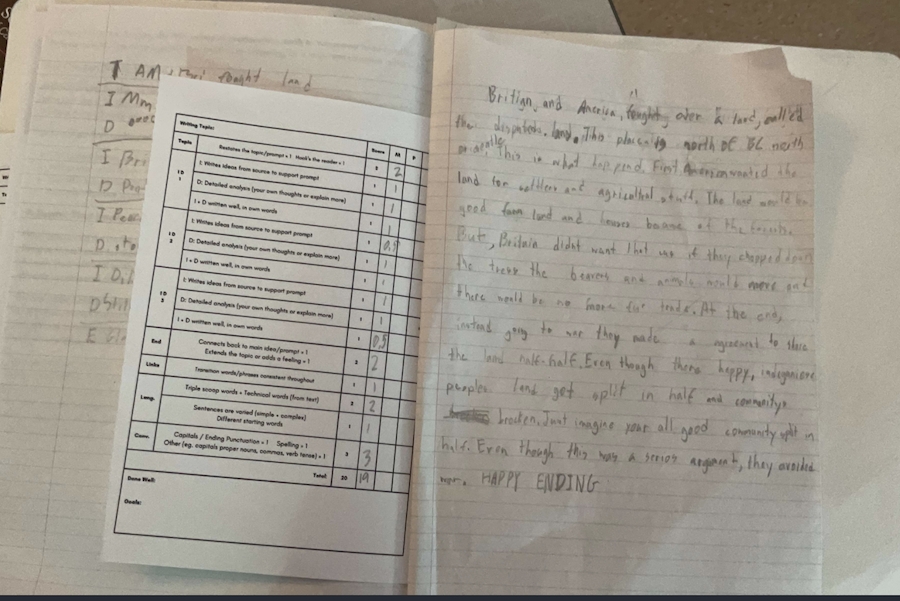
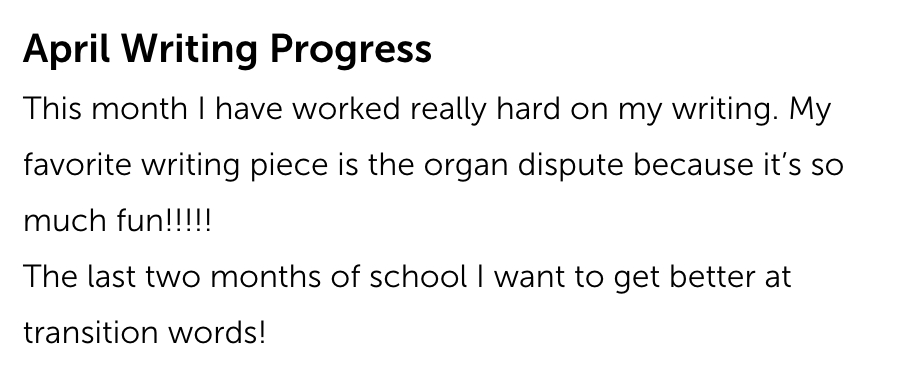
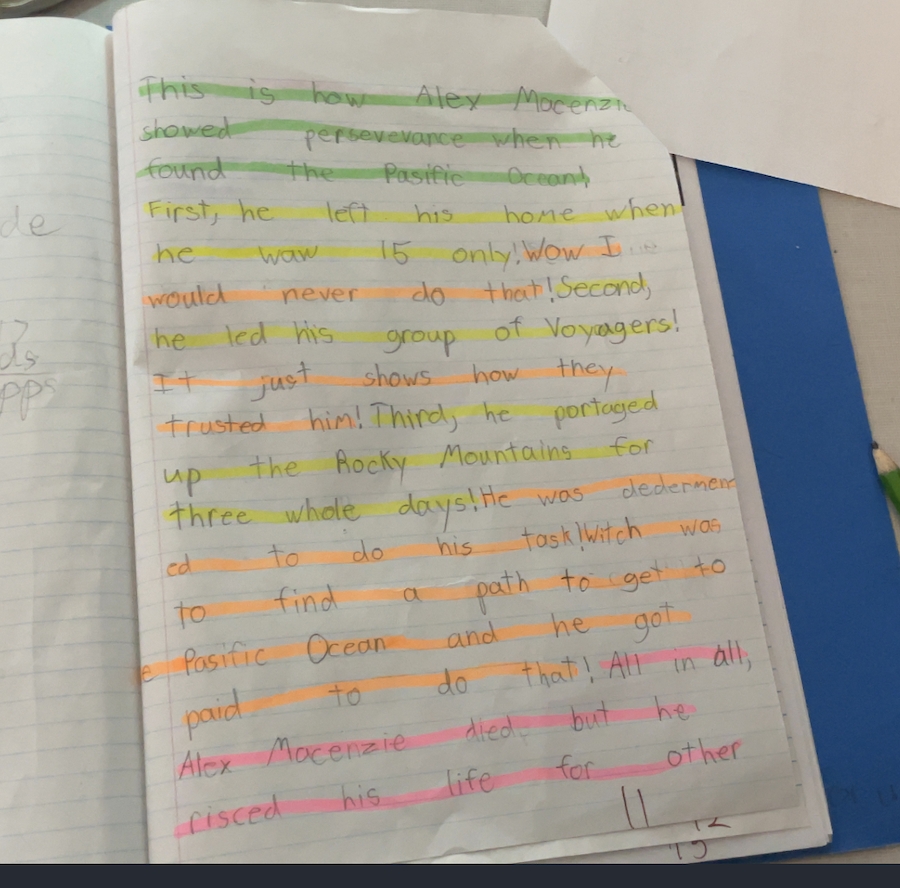
OUR NEXT STEPS
Our Next Steps
Students across our learning cohorts demonstrated significant growth in decoding, comprehension, and fluency. Most importantly, they developed a genuine appreciation and joy for reading—an enthusiasm that, in turn, brings joy to our teachers.
Looking ahead, we are committed to deepening our focus on literacy, with a particular emphasis on writing in the coming year. Staff have committed to further professional learning in Think SRSD (Self-Regulated Strategy Development) and will be participating in a writing inquiry in collaboration with the Priority Practices Literacy Helping Teachers.
Another exciting next step involves the gradual release of responsibility to students in using AI tools to support their literacy development. Students will begin working with AI to edit and create podcast scripts and generate close reading passages—activities that will further enhance their engagement, creativity, and comprehension.
We will also continue to build on our strong foundation by:
- Progressing further through the UFLI program
- Increasing opportunities for independent and partner reading to support fluency
- Expanding our writing program to include more structured narrative and informational writing
- Continuing to differentiate instruction to meet the diverse needs of our learners
This year’s success was driven by a combination of effective instructional strategies, including UFLI, Power Words, and phonics surveys, which provided structure and measurable growth. The integration of systematic phonics instruction, goal setting, and engaging literacy activities led to increased student agency, confidence, and achievement.
